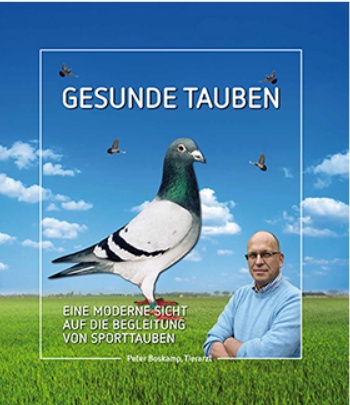13,799

There are infections and infections
I regularly get emails or phone calls from breeders asking if I can help them. You have problems. Often for a long time. The performance on the races is below average. Some say that the first few weeks of the season are fine, but after that the pigeons stop coming. I then ask what has already been done. Whether the pigeons were examined and what the findings were. Most of the time I am told that "everything" has already been checked, but that the vet said everything is fine. That is of course possible. But when I ask what was examined, I often hear that a throat swab was taken and that the feces were fine when examined. When I then ask whether the airways have also been examined, things often remain very quiet on the other side. Even if I dare to ask whether after the ‘Pestkop’ was sought, then it depends on where the lover comes from. It's possible that the breeder says their vet doesn't believe it.
was sought, then it depends on where the lover comes from. It's possible that the breeder says their vet doesn't believe it.
Of course everyone is free to believe whatever they want. It's a pity, however, that breeders completely be sent into the desert because the Pigeons are not treated properly. With proper treatment of this disease fly the pigeons usually return within two weeks. This bacterium used to be very sensitive compared to Baytril®. Many breeders and veterinarians were therefore using this product satisfied. Because everyone knew then that if your pigeons don't fly or stay away, then give them a cure and that's it solved. Unfortunately, this bacterium is largely become insensitive to this antibiotic, so the problem is more likely larger than smaller when using this drug. Despite this, Baytril® can be used in many diseases be an excellent remedy.
use of resources
However, the resistance of bacteria becomes one increasing problem. Many standard products appear in Resistance tests unlikely to be effective. The use of these funds often leads to disappointing results. In general, it is also true that you can no longer use blindly should cure substances that you are not sure whether you still have them works. Nowadays it is much better on the basis to work on an antibiogram, which determines which agent is most effective is. If often no attention is paid to the “Pestkop”, so will a sensitivity test certainly not carried out. Blind cures are often the path of choice. Very often with disappointing results. The blind cures only promote further development of resistance.
In any case, there are enough veterinarians who only do pigeons check for trichomonads, coccidiosis and worms and then contact the breeder calm down with the words that everything is fine. Albeit an examination of the airways carried out, and that is also okay, that would be a lot better statement. But in the respiratory tract there is hardly any search for mucus, fungi, Inflammatory cells etc. wanted. A missed opportunity and it's so easy implement. A must for any grower dealing with underwhelming performance struggles. Then it's Russian roulette when you blind kurt.
In any case, there are enough veterinarians who only do pigeons check for trichomonads, coccidiosis and worms and then contact the breeder calm down with the words that everything is fine. Albeit an examination of the airways carried out, and that is also okay, that would be a lot better statement. But in the respiratory tract there is hardly any search for mucus, fungi, Inflammatory cells etc. wanted. A missed opportunity and it's so easy implement. A must for any grower dealing with underwhelming performance struggles. Then it's Russian roulette when you blind kurt.
The moment you kurt blind and not was checked whether the "Pestkop" bacterium is present, then that's not only a missed opportunity, but the breeder is the fool, because then often not that proper means of healing is employed, leaving the "Pestkop" bacterium only gets even stronger. The “Pestkop” bacterium is a specific bacterium by the way from the group of Pseudomonas. Compare it to the Salmonella bacteria. There are also many types. But in pigeons only the Salmonella type is Typh. Var. Copenhagen present. The other guys don't. Of the approximately 200 species of Pseudomonas there is only one species that has been found exclusively in pigeons.
So far so good. I wrote there are infections and infections. There are infections that occur in many pigeons, and in In these cases, standard remedies still work well, provided there are no “plague head” . The pigeons can then recover quickly and the fancier can happily take part in travel again.
But those aren't the complaints we're about usually be called or emailed. In these cases, a paratyphoid fever was often identified as the cause of the misery already ruled out. There are those breeders who often have several veterinarians in Germany and abroad have visited abroad. The has only countless cures without significant results brought. In a number of cases, a standard bacteriological test carried out in laboratory X, Y or Z. labs, the do not focus on research on pigeons. The disappointments can therefore also after these investigations still be great.
Commonly diagnosed infections are Streptococci, Staphylococci and E. Coli. Sometimes chlamydia. Now I must say that the latter, the Clamydia, can cause problems. A targeted treatment approach can do a lot mean.
But the other bacteria are often found what makes me wonder if they are the cause of the misery. Mostly these pigeons are due to the many Antibiotics are so weakened that it is better to improve the general Defenses and bowel function to work when going back for a cure with decide on another antibiotic. We also often find Klebsiella in pigeons. This bacterium can cause a cause pneumonia. A violent one. But with pigeons it's usually not that bad. What we see is that this bacterium at Breeders who have cured a lot are found more often and they against many standard remedies is multiresistant. A very uncomfortable situation.
blind cures
blind cures
The most likely explanation for that Presence of these germs and the possible problems caused by them is the fact that almost all of these breeders have multiple cures from been prescribed by several veterinarians. Unfortunately not effective against these exotic ones germs. These then become stronger while the natural The pigeons' defenses are systematically lowered by the cure. The end result may well be this Germs that hardly cause any problems for pigeons without a significant loss of resistance can suddenly lead to long-term loss of shape and problems.
The moral of this story. Blind cures are in the age of Pigeon top sports no longer desired. In the case of serious problems, a Thorough research must be carried out, which is significantly more than faecal examinations and throat swabs. It should be considered to send samples to a specialized Send lab to detect hidden infections. It is at least as important, however, that a good Intestinal environment is promoted and a good one general resilience is built.
Good luck!

Advertising:

The moral of this story. Blind cures are in the age of Pigeon top sports no longer desired. In the case of serious problems, a Thorough research must be carried out, which is significantly more than faecal examinations and throat swabs. It should be considered to send samples to a specialized Send lab to detect hidden infections. It is at least as important, however, that a good Intestinal environment is promoted and a good one general resilience is built.

So there are different vaccines to prevent diseases. In practice, therefore, most vaccines are satisfactory. I vaccinate my own pigeons with RP = Rota Paramyxo (2x) and PHA = Paramyxo Herpes and Adeno (2x). I am very happy with it. But as I often say:
The medical care in the pigeon sport is traditionally based on the aimed at healing sick pigeons. Drugs are often already used preventively. Due to the high risk of infection during the During the flying season, the use of medication is often essential. the Pigeon racing is a top sport. Even the smallest deviations can decide between victory or defeat. Today's legislation makes professional medical care in pigeon racing more difficult.
Medical care in pigeon racing is traditionally aimed at healing sick pigeons. Drugs are often used preventively. Due to the high risk of infection during the flight season, the use of medication is often essential. The pigeon sport is a top sport. Even the smallest deviations can decide between victory and defeat. Today's legislation makes professional medical care in pigeon racing more difficult. Medical care in pigeon racing is traditionally aimed at healing sick pigeons. Drugs are often used preventively. Due to the high risk of infection during the flight season, the use of medication is often essential. The pigeon sport is a top sport. Even the smallest deviations can decide between victory and defeat. Today's legislation makes professional medical care in pigeon racing more difficult.
Medical care in pigeon racing is traditionally aimed at healing sick pigeons. Drugs are often used preventively. Due to the high risk of infection during the flight season, the use of medication is often essential. The pigeon sport is a top sport. Even the smallest deviations can decide between victory and defeat. Today's legislation makes professional medical care in pigeon racing more difficult.



